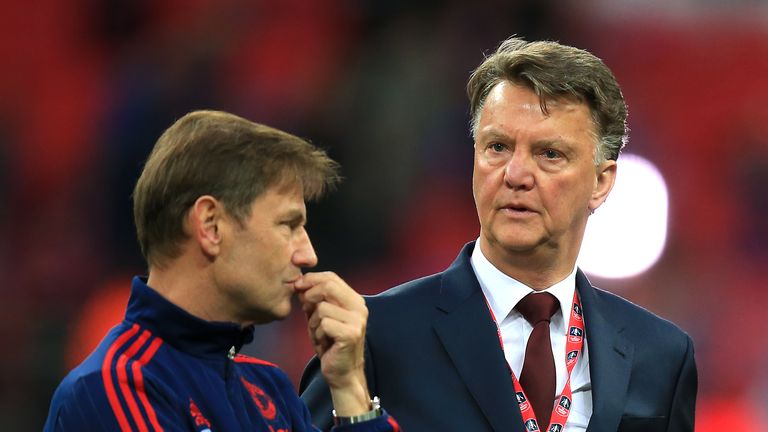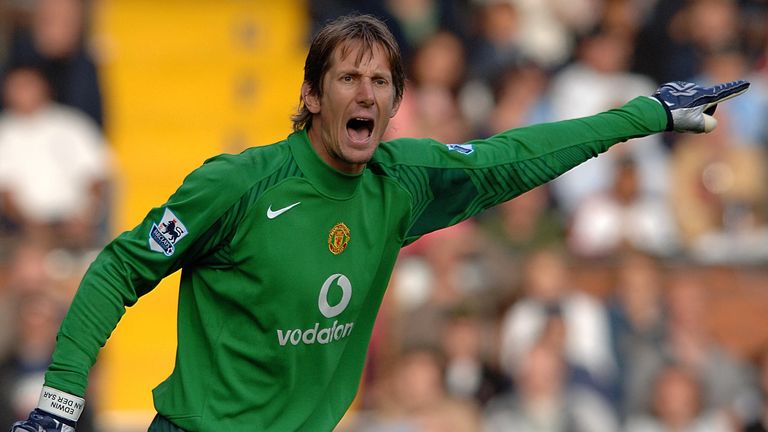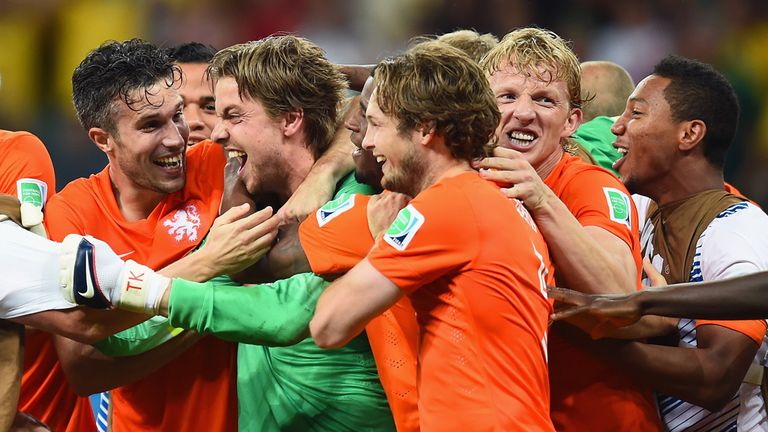Goalkeeper or goalplayer? Frans Hoek on the evolution of game's No 1 and the birth of a new type of footballer
In this exclusive interview with Sky Sports, the great goalkeeper coach Frans Hoek discusses the evolution of the role and why the word 'goalkeeper' does not cut it now
Wednesday 11 December 2024 17:07, UK
Frans Hoek is reluctant to use the term 'goalkeeper'. It is, he argues, outdated. "It is not sufficient anymore," he tells Sky Sports. "It does not cover it. The game changes. It is about more than keeping it out of the net. I came up with the term 'goalplayer'."
The former Ajax, Barcelona, Bayern Munich and Manchester United goalkeeper coach certainly has the credentials to alter the nomenclature. "It might be romantic but we do not use the word 'libero' anymore. It should be the same with goalkeeper," he explains.
"I ask everyone at my clinics and nobody has come up with an argument against goalplayer. One person told me that when they come to claim the ball, they say 'keeper. I have called it this for 10 years and that is the only argument anyone has come up with."
- Get Sky Sports or stream with NOW
- Download the Sky Sports app | Get Sky Sports on WhatsApp
- Live Premier League table | Watch PL highlights for free
Fuelled by the curiosity that has long made him one of the game's great innovators, his own story goes hand in hand with the development of the modern game as we know it. Few can claim to have been at the heart of the goalkeeper's evolution like Hoek.
Handpicked by Johan Cruyff to reimagine goalkeeper coaching at Ajax in 1985, he also worked closely with Rinus Michels, the father of Total Football, before winning the Champions League with the Dutch club alongside Louis van Gaal a decade later.
Trending
- World Darts Championship: Humphries headlines opening night LIVE!
- Chelsea hold on to beat Brentford - rate the players LIVE!
- Southampton 0-5 Tottenham - free highlights and rate the players!
- Derby day DRAMA! Amad steals show to pile pressure on Pep's City
- Man City 1-2 Man Utd highlights & rate the players!
- Amorim explains leaving out Rashford and Garnacho from Manchester derby
- Pep says 'I'm not good enough' as Man City crisis deepens
- Hojlund's love letter to Walker after Manchester derby clash
- 'No more!' | Neville backs Amorim move to drop Garnacho and Rashford
- Cucurella and Jackson score to overcome spirited Brentford
"They are my three influences. Cruyff taught me more in a week than I had learned in 12 years as a player. It was an incredible level. I thought it was normal," said Hoek. The important thing to stress is that his ideas are not just theory. He has tested them at the top of the game.
"I have tried everything and made all the mistakes you can imagine," he adds. "I have experimented and developed a whole methodology, particularly since Bayern. And I always start with the game, never the player. It is the game that decides what goalplayer you need."
The game could hardly be more emphatic in its answer. While the number of saves that a goalkeeper makes in a match has remained pretty much constant, the rest of the role on the pitch has been transformed. The ability to pass the ball is now hugely significant.
Many goalkeepers are responsible for initiating the build-up in ways that would have been unfathomable not so long ago. The evidence of seismic change is right there in the statistics. The number of passes played in their own half has doubled inside a decade.
Of the players to have spent the most time on the ball per game in the Premier League over the past three seasons, three of the top four are goalkeepers. And that number is ever increasing. The time has increased by 26 per cent from just two seasons ago.
It is ironic given that the introduction of the back-pass law was designed to prevent those long periods during which the goalkeeper held possession. Thirty years on, they have become so good with their feet that the ball is now back with the goalkeeper.
Hoek feels vindicated. "When I called it a 1-4-3-3, the whole world laughed. Johan used it, Louis used it. But everyone else said, 'The one is always there, always the same.' Well, look what happens nowadays." With that, he is rushing to show another clip.
It is of Ederson in the Champions League final, stepping forward to form a line of three with the two centre-backs. "Is this 1-4-3-3 or is it 3-5-3? Who would have thought the goalkeeper would be in front of the defenders but I can give you a million examples."
Hoek, at Cruyff's instigation, was ahead of the game. Stanley Menzo became the prototype for the shift in emphasis at Ajax before Hoek helped Van Gaal to identify Edwin van der Sar as his successor, becoming perhaps the first suitable for the new role.
"There was before '92 and after '92. The pass-back rule changed it all. Before that, the goalkeeper icons were big and strong but when the ball started to be passed back to them, it was just about surviving and kicking it away. They were not educated in that way.
"Edwin came along and looked completely different. When me and Louis scouted him, nobody believed in him but the moment the pass-back rule came in, it was a big advantage for him. The rule change was a coincidence but the profile of player was not."
At Ajax, the great innovation was to integrate the goalkeeper into the team's training sessions in a way that had not been seen before. "I proposed that we should train more as a team. And we became a team on the pitch." Cruyff agreed completely.
Ever since, Hoek has resisted the idea that the goalkeeper is a separate entity in need of being coached in isolation. This guiding principle has been the secret of his success. He keeps putting goalkeepers in game situations and coaches them from there.
"They always say goalkeepers are better when they are older. Why is that? I can tell you. It is because they have more experience in game situations. They are always training separately so it is the game that makes them better. So I brought the game to the training ground.
"Victor Valdes and Pepe Reina were training with the Barcelona first-team at 16 or 17. The players were p***** because every shot was a goal. But after a few weeks, they started to make saves and help with the build-up because they were training with high-level players.
"I did not need to say anything. The game guided them. They were teenagers when they debuted. Of course, they made mistakes. But they started to recognise the situations. It was the same with Edwin. Bring the game to training and they get better in no time."
You might think that this way of working has become so accepted now that it is commonplace. Hoek is not convinced. "It sounds simple but is it really happening at the moment? That is the question." He still sees old-fashioned coaching methods.
Hoek shows a video of the great German coach educator Hennes Weisweiler from 1957 training a goalkeeper by getting them to dive to one side and then the other. His point is that almost 70 years on, this approach to coaching goalkeepers has barely changed.
"This is what is happening today. Look on the internet, this is what you will see. The goalkeeping world is influenced by these clips. They say it tests them physically and technically. My question is always the same. What is the relationship to the game?"
"When I started, there were basically no goalkeeper coaches. Now there are millions of them, sometimes three or four with the first team. It is amazing. We should be overloaded with quality goalkeepers but the funny thing is that the opposite is true."
He does not see it as coincidence that Spain and Brazil now lead the way in goalkeeper development while many traditional powerhouses of European football are struggling to identify and develop talent. Culturally, Spanish and Brazilian goalkeepers grow up with the ball.
Naturally, he thinks specialising too young is a mistake. "Until the age of 10, you should never specialise," he argues. "Between 10 and 14 is early enough. They should all be on the pitch. You should rotate the goalplayer every game. Even if they do not want it."
He adds: "In the end, you will have more boys and girls who like the position. And you can easily teach the technique of catching and diving in two years, I am convinced of that. It is very simple. But teaching the game? Do that and your task will be a lot easier.
"Going out to do three or four exercises and thinking the job is done, it does not work anymore. You need to coach them in specific situations. If you have a lot of the ball, work on that. Always go back to the game. That is how you become better. It is simple."
It is partly why he admires the work of Roberto De Zerbi. "There is a lot of risk but you can see how fast it improved because they did in training what they wanted to do in the game. If you only work on technique, you never learn the game, you just learn a trick."
He enjoyed a recent television debate between Peter Schmeichel and Thierry Henry in which the great Dane was arguing that a goalkeeper should not be rotated like a striker because they were different beasts. Hoek's sympathies were squarely with Henry.
He baulks at the use of the phrase 'the 'keepers' union' for much the same reason. "It is crazy. Yes, they are a bit different, but so is the centre-forward and so is the left-winger. We need to get this idea of it being a completely separate job out of our minds."
That is not to say that he does not want to see more pundits on his television screen with a deeper understanding of the role. "Many experts on television say this was fantastic or that was a mistake but there is no proper knowledge behind it," he says.
His frustrations are myriad. "Believe me, I could do a whole separate lecture about the block. How many goals are scored because they make the wrong block at the wrong moment at the wrong speed. Nobody discusses it. They just say it is a goal."
Even as the game evolves in a direction many would say that he had anticipated all those years ago, he is concerned that coaches are not keeping up. It still frustrates him that goalkeeper coaches, like the goalkeepers themselves, are viewed separately.
"A goal is conceded and they all look at the goalplayer coach. How is that possible? No, all the staff do it together." He was Van Gaal's assistant, not his mere goalkeeper coach, and cannot understand why goalkeeper coaches do not have their full qualifications.
"They say that a coaching licence is enough. No, it is not enough. You need a better understanding of the game than that. There should be total integration. I partly coached the defence at the World Cup in 2014. How can you do that without the knowledge?"
He still has an eye on innovation, determined to stay ahead of the game. It is a decade since Hoek advised that Van Gaal bring on Tim Krul specifically for a penalty shootout at that World Cup. "Many copy it now," he says. "And not always for the right reasons."
In the past, he has wondered what would happen if goalkeepers were not allowed to use their hands at all. Put it to him that they could be substituted for outfield players when chasing the game and he smiles. "I love it. This is why goalplayer is a good name!"
He adds: "The goalplayer needs to defend by keeping the ball out of the net and attack with the build-up. They are athletes now, almost the same as the other players. The only difference is that they are wearing gloves and a different coloured shirt."
He is excited about two young Japanese goalkeepers who he has helped to identify in his bid to help the country to win a World Cup by 2050. His ideas are also being implemented, for example, within the Red Bull group and Inter's academy in Milan. But he is impatient.
"I can only make the stone roll." Football is changing but you sense that the game is still catching up with the inimitable Frans Hoek.







